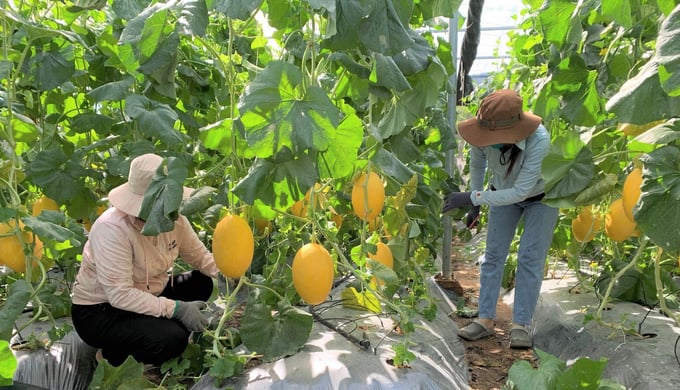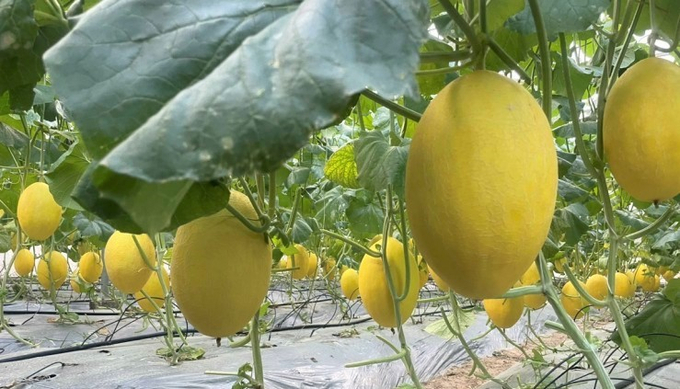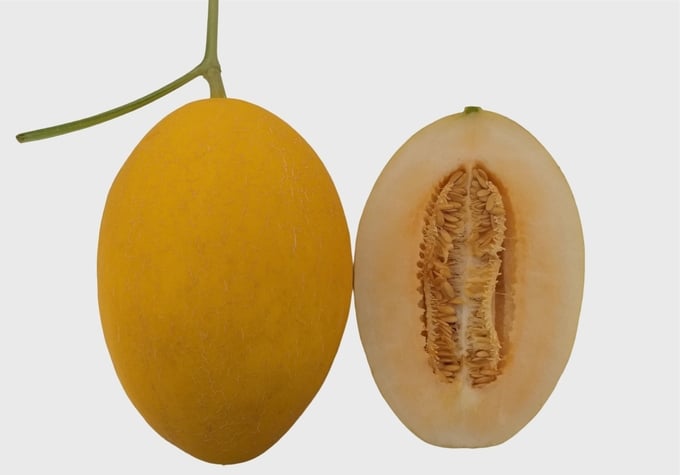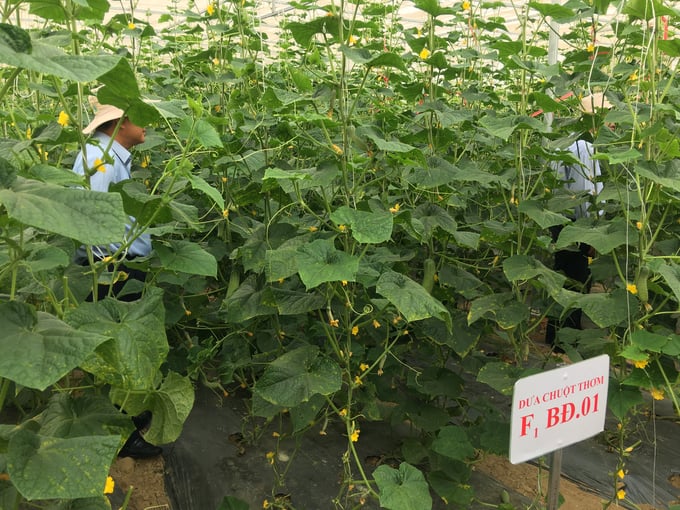May 29, 2025 | 15:23 GMT +7
May 29, 2025 | 15:23 GMT +7
Hotline: 0913.378.918
May 29, 2025 | 15:23 GMT +7
Hotline: 0913.378.918
Currently, vegetable production in Vietnam depends on 90% of F1 hybrid vegetables imported from abroad, especially cantaloupe seeds are almost 100% dependent on imported sources.
Faced with that situation, the Ministry of Agriculture and Rural Development has directed scientific research units under the Ministry to focus on research and selection of vegetable varieties specifically F1 hybrid vegetable varieties to reduce dependence on imports.

Hoang Ngan cantaloupe grown at the nethouse of Agricultural Science Institute for Southern Coastal Central of Vietnam (ASISOV). Photo: V.D.T.
Since 2015, the Agricultural Science Institute for Southern Coastal Central of Vietnam (ASISOV) has focused its resources on the selection and creation of F1 hybrid vegetable varieties, and Hoang Ngan cantaloupe is one of them. ASISOV's successful selection of the Hoang Ngan cantaloupe variety is crucial in the current context.
In 2018, based on available materials, ASISOV started to research, select and breed F1 hybrid cantaloupe. By 2021, the F1 Hoang Ngan hybrid cantaloupe complex was completed. Since then, ASISOV has produced F1 hybrid seeds of Hoang Ngan cantaloupe and conducted trial planting in a number of localities in the South Central Coast and Central Highlands such as Ninh Thuan and Gia Lai, mostly focusing on Binh Dinh because Hoang Ngan cantaloupe is particularly suitable for the climate and soil conditions of the area.
According to Vu Van Khue, Deputy Director of ASISOV, after the trial period, Hoang Ngan cantaloupe variety gave very positive results. Hoang Ngan melon can be grown continuously for three crops per year. Hoang Ngan cantaloupe can be grown in a nethouse on a substrate in potting bag or directly on the ground. In any condition, the plant can grow and develop well thanks to its high resistance to pests and diseases.

Hoang Ngan cantaloupe is not inferior to the yellow-skinned cantaloupe varieties currently popular on the market. Photo: V.D.T.
Hoang Ngan cantaloupe has large female flowers, easy to fruit. The fruit is elliptical, the average length is 22 cm and the diameter is 14 cm. The rind is bright yellow when ripe. The flesh is light orange, very crunchy and sweet. In the yellow-skinned melon segment which is currently popular on the market, Hoang Ngan cantaloupe can be considered a strong contender.
In Binh Dinh, ASISOV's Hoang Ngan cantaloupe variety has been tested in many localities, from the plains to the midlands. Since 2021 Hoang Ngan cantaloupe has been continuously grown in the institute's nethouse with an average area of 1,000 m2/year. The growing model applied by ASISOV gives positive results. The fruit weighs from 1.5 to 2 kg per fruit, which result in an average yield of 3.5-4 tons/1,000 m2/crop.
In 2022, ASISOV continued to test Hoang Ngan cantaloupe on an area of 500 m2 in a nethouse in Dieu Tri town (Tuy Phuoc district, Binh Dinh). The production model in Dieu Tri gave even better results, reaching 1.6 - 2.1 kg/fruit, and the average yield was 3.8 - 4.2 tons/1,000 m2/crop.
The institute also conducted a trial planting of this variety at Quang Trung University (Quy Nhon City, Binh Dinh) with an area of 200 m2 while using plant substrate, potting bag in a nethouse. The fruit weight reached 1.4 - 1.6 kg/fruit, the average yield was 3.2 - 3.5 tons/1,000 m2/crop.

Hoang Ngan cantaloupe has received recognition and very positive feedback from consumers. Photo: V.D.T.
At the beginning of 2023, ASISOV tested this hybrid variety in Phu My district on an area of 500 m2. The fruit weight of this model was 1.6 - 2 kg/fruit, the average yield was 3.8 - 4 tons/1,000 m2/crop. There was another model in Hoai An district with an area of approximately 400 m2. The fruit weight was 1.5-2 kg/fruit, the average yield was 3.5-4 tons/1,000 m2/crop.

In the future plan, ASISOV will commercialize the F1 hybrid aromatic cucumber variety, one of the research results of the institute aimed at the production industry. Photo: V.D.T.
“Through trial production in all models, Hoang Ngan cantaloupe products have been recognized by consumers and received very positive feedback. The average revenue at the trial sites is VND 140 million /1,000 m2/crop. After deducting costs, growers can still gain a profit of VND 70-80 million/1,000 m2/crop,” said Vu Van Khue, Deputy Director of ASISOV.
Translated by Samuel Pham
/2025/05/25/4127-3-073637_820.jpg)
(VAN) Thanks to the promotion from an FAO-implemented project, vegetable production in greenhouses in Moc Chau has seen strong development, from 1.5 hectares in 2021 to nearly 50 hectares in 2024.

(VAN) FAO has recently supported USD 140,000 to implement the project 'Risk mitigation human-animal interface risks through disease control initiatives in pig farming.'

(VAN) The People's Committee of Tra Vinh province has approved an adjustment to the investment policy for the Green Hydrogen Plant project, increasing its area to approximately 52.76 hectares.
![Reducing emissions from rice fields: [2] Farmers’ commitment to the soil](https://t.ex-cdn.com/nongnghiepmoitruong.vn/608w/files/news/2025/05/05/dsc08881jpg-nongnghiep-140632.jpg)
(VAN) Clean rice cultivation model in Thuong Tan commune, Bac Tan Uyen district, is assisting local residents in achieving sustainable agriculture by substantially reducing costs, increasing productivity, and protecting the environment.

(VAN) At the conference to disseminate Resolution No. 68, AgriS introduced its digital agricultural ecosystem and reaffirmed its commitment to accompanying the Government in promoting private sector development and sustainable agriculture.

(VAN) 'Blue Ocean - Blue Foods' initiative is designed to restore marine ecosystems and establish sustainable livelihoods for local communities by cultivating a minimum of 1,000 hectares of cottonii seaweed in the first three years.
/2025/05/21/4642-3-112707_603.jpg)
(VAN) The V-SCOPE project has made direct contributions to three out of six pillars of the Comprehensive Strategic Partnership between Vietnam and Australia.